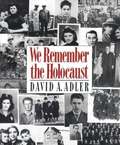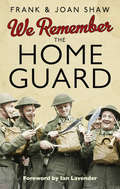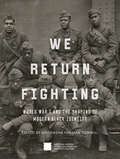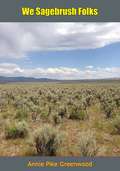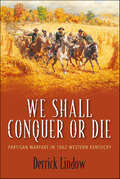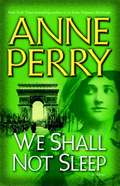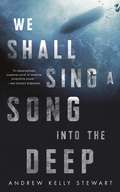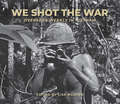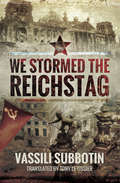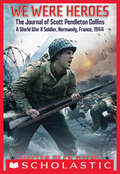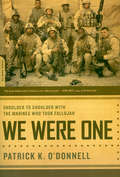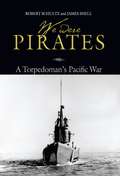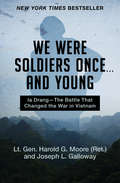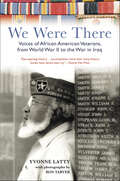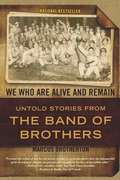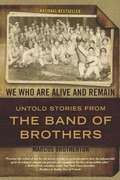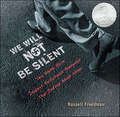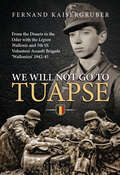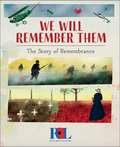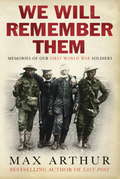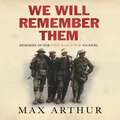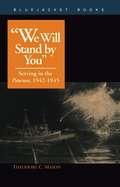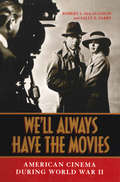- Table View
- List View
We Remember the Holocaust
by David A. AdlerWe Remember the Holocaust chronicles the Holocaust in the voices of those who survived it. They tell us about Jewish life in Europe before the 1930s and about the violence of Hitler's rise to power. They describe the humiliations of Nazi rule, the struggle to keep families together, the fight for survival in the ghettos, the ultimate horror of the concentration camps. With its moving first-person voices and original photographs from private collections,We Remember the Holocaust is an intensely personal contribution to the history of a period that must never be forgotten.
We Remember the Home Guard
by Frank Shaw Joan Shaw'I remember standing on top of our local glen with a block of wood, expecting thousands of Germans coming down from the sky. What was I going to do with the block of wood? I never knew.' Leonard JacksonOn 22 June 1940 France surrendered to Germany and the invasion of Britain seemed a very real possibility.The Home Guard was formed to defend our villages and towns. Members came from reserved occupations, those who had failed their medicals, the elderly and the young, with miners and farmers training alongside former majors. Their weapons and ammunition were negligible at first, but slowly these amateur soldiers began to produce professional results.In this unique book of reminiscenses about life on the home front, we see these men as they practise with pitchforks and fall into ditches after a pint or two of ale on the job. But we also see them learning how to fire grenades after a day studying engineering and undertaking night watches after exhausting factory shifts - knowing they could be the last stop between the enemy and their families and homes.
We Return Fighting: World War I and the Shaping of Modern Black Identity
by Nat'l Mus Afr Am Hist CultureA richly illustrated commemoration of African Americans' roles in World War I highlighting how the wartime experience reshaped their lives and their communities after they returned home.This stunning book presents artifacts, medals, and photographs alongside powerful essays that together highlight the efforts of African Americans during World War I. As in many previous wars, black soldiers served the United States during the war, but they were assigned to segregated units and often relegated to labor and support duties rather than direct combat. Indeed this was the central paradox of the war: these men and women fought abroad to secure rights they did not yet have at home in the States. Black veterans' work during the conflict--and the respect they received from French allies but not their own US military--empowered them to return home and continue the fight for those rights. The book also presents the work of black citizens on the home front. Together their efforts laid the groundwork for later advances in the civil rights movement.We Return Fighting reminds readers not only of the central role of African American soldiers in the war that first made their country a world power. It also reveals the way the conflict shaped African American identity and lent fuel to their longstanding efforts to demand full civil rights and to stake their place in the country's cultural and political landscape.
We Sagebrush Folks
by Annie Pike GreenwoodFirst published in 1934, this book tells the story of an American farm woman, her husband and family, and vividly describes farm life and farm psychology.“We Sagebrush Folks tells the experiences of a woman of education, refinement, and culture, who went with her husband to plow up wealth in the land under the then new Minidoka Irrigation Project in Southern Idaho. The ‘heart of gold’ that experience held was the beauty of Idaho, its sunshine, its sky by day and by night, its mountains, its vast stretches of gray-green sagebrush, which she saw transformed into fields and farms, its pure, clear, inspiring, stimulating air—and what all these meant to her, emotionally and spiritually. She writes with intelligence, a notable gift for expression, and a considerable interest in and knowledge of economics. An intimate, colorful portrayal of the daily life of the sagebrush farmers and their families, mercilessly truthful, but written with vivacity, cleverness, and humor, full of anecdotes, tales, and incidents that are often amusing, sometimes tragic, but always told with a keen sense of their dramatic values.” (FLORENCE FINCH KELLY, New York Times Book Review)
We Shall Conquer or Die: Partisan Warfare in 1862 Western Kentucky
by Derrick LindowIn We Shall Conquer or Die, Derrick Lindow unveils the untold story of the deadly guerrilla warfare in 1862 Western Kentucky, highlighting the fierce battles and personal struggles that shaped the region's Civil War narrative. Western Kentucky: a deadly and expensive war within a war raged there behind the front and often out of the major headlines. In 1862, the region was infested with guerrilla activity that pitted brother against brother and neighbor against neighbor in a personal war that recognized few boundaries. The raiding and fighting took hundreds of lives, destroyed or captured millions of dollars of supplies, and siphoned away thousands of men from the Union war effort. Derrick Lindow tells this little-known story for the first time in We Shall Conquer or Die: Partisan Warfare in 1862 Western Kentucky. Confederate Col. Adam Rankin Johnson and his 10th Kentucky Partisan Rangers wreaked havoc on Union supply lines and garrisons from the shores of southern Indiana, in the communities of western Kentucky, and even south into Tennessee. His rangers seemed unbeatable and uncatchable that second year of the war because Johnson’s partisans often disbanded and melted into the countryside (a tactic relatively easy to execute in a region populated with Southern sympathizers). Once it was safe to do so, they reformed and struck again. In the span of just a few months Johnson captured six Union-controlled towns, hundreds of prisoners, and tons of Union army equipment. Union civil and military authorities, meanwhile, were not idle bystanders. Strategies changed, troops rushed to guerrilla flashpoints, daring leaders refused the Confederate demands of surrender, and every available type of fighting man was utilized, from Regulars to the militia of the Indiana Legion, temporary service day regiments, and even brown water naval vessels. Clearing the area of partisans and installing a modicum of Union control became one of the Northern high command’s major objectives. This deadly and expensive war behind the lines was fought by men who often found themselves thrust into unpredictable situations. Participants included future presidential cabinet members, Mexican War veterans, Jewish immigrants, some of the U.S. Army’s rising young officers, and the civilians unfortunate enough to live in the borderlands of Kentucky. Lindow spent years researching through archival source material to pen this important, groundbreaking study. His account of partisan guerrilla fighting and the efforts to bring it under control helps put the Civil War in the northern reaches of the Western Theater into proper context. It is a story long overdue.
We Shall Not Sleep: 1918 (World War One #5)
by Anne PerryAnne Perry's magnificent Victorian mysteries established her as one of the world's best known and loved historical novelists. Now, in her vividly imagined World War I novels, Perry's talents "have taken a quantum leap" (The Star-Ledger), and so has the number of her devoted readers. We Shall Not Sleep, the final book in this epic series featuring the dedicated Reavley family, is perhaps the most memorably enthralling of all Perry's novels. After four long years, peace is finally in sight. But chaplain Joseph Reavley and his sister Judith, an ambulance driver on the Western Front, are more hard pressed than ever. Behind the lines, violence is increasing: soldiers are abusing German prisoners, a nurse has been raped and murdered, and the sinister ideologue called the Peacemaker now threatens to undermine the peace just as he did the war. Then Matthew, the third Reavley sibling and an intelligence expert, suddenly arrives at the front with startling news. The Peacemaker's German counterpart has offered to go to England and expose his co-conspirator as a traitor. But with war still raging and prejudices inflamed, such a journey would be fraught with hazards, especially since the Peacemaker has secret informers everywhere, even on the battlefield. For richness of plot, character, and feeling, We Shall Not Sleep is unmatched. Anne Perry's brilliantly orchestrated finale is a heart-stopping tour de force, mesmerizing and totally satisfying.
We Shall Sing a Song into the Deep
by Andrew Kelly Stewart“A claustrophobic suspense novel of immense propulsive power.”—Kim Stanley Robinson A Canticle for Leibowitz meets The Hunt for Red October in We Shall Sing a Song into the Deep, a lyrical and page-turning coming-of-age exploration of duty, belief, and the post-apocalypse from breakout newcomer Andrew Kelly Stewart.Remy is a Chorister, rescued from the surface world and raised to sing in a choir of young boys. Remy is part of a strange crew who control the Leviathan, an aging nuclear submarine, that bears a sacred mission: to trigger the Second Coming when the time is right.But Remy has a secret too—she’s the submarine’s only girl. Gifted with the missile’s launch key by the Leviathan’s dying caplain, she swears to keep it safe. Safety, however, is not the priority of the new caplain, who has his own ideas about the mission. When a surface-dweller is captured during a raid, Remy’s faith becomes completely overturned. Now, her last judgement may transform the fate of everything.At the Publisher's request, this title is being sold without Digital Rights Management Software (DRM) applied.
We Shot the War: Overseas Weekly in Vietnam
by Lisa NguyenWe Shot the War: Overseas Weekly in Vietnam examines the legacy of one of the most popular and eccentric newspapers to cover the Vietnam War. With its mix of hard-hitting military exposÉs, pinups, and comic strips, Overseas Weekly earned a reputation as a muckraking truth teller. Time magazine called it "the least popular publication at the Pentagon." From 1966 to 1972, the paper's reporters and photographers tackled controversial topics, including courts-martial, racial discrimination, drug use, and opposition to command. And they published some of the most intimate portraits of American GIs and Vietnamese civilians, taken with the specific purpose of documenting the daily life of individuals caught in the world's most grueling and disputed conflict. Through striking photographs and personal essays, We Shot the War brings viewers behind the viewfinders of photojournalists who covered the conflict and introduces readers to two extraordinary women: founder Marion von Rospach and Saigon office bureau chief Ann Bryan. Together, they fought for the right of women to report in combat zones and argued against media censorship. Foreword by Eric Wakin Contributors: Cynthia Copple, Art Greenspon, Don Hirst, Brent Procter
We Stormed the Reichstag
by Tony Le TissierIn 1941 when Germany invaded the Soviet Union Vassili Subbotin was caught up as an ordinary soldier in the Red Armys great retreat. In 1945, during the final days of the war, as a war correspondent, he went into Berlin with the troops who fought the ferocious final battles in the streets and sealed Germanys defeat. Later he recorded in vivid impressionistic detail the climax of the last act of the campaign and of the entire war in the east the storming of the Reichstag which came to symbolize of the Soviet victory over the Nazis. His firsthand experience of that final operation and his insight into the small band of ordinary soldiers who played a part in it is graphically conveyed in this memoir. In his description of the confusion and violence of the street fighting around the Reichstag and the vicious hand-to-hand floor-by-floor struggle to capture the huge shattered building, the personalities of the soldiers are revealed, as are their fears and determination. Vassili Subbotin served as a conscript in the Red Army during the Second World War, first as an infantryman during the Soviet retreat after the German invasion in 1941, then as a divisional war correspondent during the Red Armys long advance towards Germany. He was present throughout the final battle for Berlin and observed the capture of the Reichstag at first hand. After the war he wrote this evocative memoir recording his experiences and those of the soldiers who took part, and in later life he was reunited with those who survived the fighting.
We Were Heroes: The Journal of Scott Pendleton Collins, a World War II Soldier
by Walter Dean MyersNewbery and Coretta Scott King award-winning author Walter Dean Myers's the WWII JOURNAL OF SCOTT PENDLETON COLLINS is now available in paperback, with an exciting repackaging! Following in the footsteps of his father and great-grandfather, both war veterans, Scott Pendleton Collins signs up for the army during the height of World War II. He is shipped out to England only to face weeks of boredom. He and his unit want to be out in the fields, doing something to help the Allied forces. Finally, the comrades find themselves on a boat heading to Normandy, France, in the dead of night. But as his boat approaches the beach, Scott suddenly realizes what they are up against, and it is an impossible invasion. Nothing in basic training, nothing he's heard from other soldiers, nothing he has ever experienced prepares Scott for what awaits on Omaha Beach. As D-Day rages around him, Scott is separated from his unit. Lost in the bloody chaos, he must find a way to live through the battle. Revolving around one of the most famous invasions in history, Scott's story is one of bravery and victory, heartache and pain, loss and survival.
We Were One: Shoulder to Shoulder with the Marines Who Took Fallujah
by Patrick O'DonnellFive months after being deployed to Iraq, Lima Company’s 1st Platoon, 3rd Battalion, 1st Marine Regiment, found itself in Fallujah, embroiled in some of the most intense house-to-house, hand-to-hand urban combat since World War II. In the city’s bloody streets, they came face-to-face with the enemy-radical insurgents high on adrenaline, fighting to a martyr’s death, and suicide bombers approaching from every corner. Award-winning author and historian Patrick O’Donnell stood shoulder to shoulder with this modern band of brothers as they marched and fought through the streets of Fallujah, and he stayed with them as the casualties mounted.
We Were Pirates
by James Shell Robert SchultzA sailor's extraordinary experiences on an American submarine in the Pacific are candidly reported in this eyewitness account of war from a torpedoman's perspective. Robert Hunt managed to survive twelve consecutive war patrols on the submarine USS Tambor. During the course of the war, Hunt was everywhere that mattered in the Pacific. He stood on the bow of the Tambor as it cruised into Pearl Harbor just days after the devastation of the Japanese air raid, peered through binoculars as his boat shadowed Japanese cruisers at the Battle of Midway, ferried guns and supplies to American guerilla fighters in the Philippines, fired torpedoes that sank vital Japanese shipping, and survived a near-fatal, seventeen-hour depth-charge attack. For "exceptional skill and proficiency at his battle station" Hunt received a commendation from Fleet Admiral Chester W. Nimitz. This WWII torpedoman's account of the war offers the rare perspective of an enlisted seaman that is not available in the more common officer accounts.To capture the progress of the Pacific War through Hunt's eyes coauthors Robert Schultz and James Shell examined the young submariner's war diary, as well as crew letters, photographs, and captains' reports, and they also conducted hours of interviews. Their vivid descriptions of the ways in which sailors dealt with the stress of war while at sea or on liberty show a side of the war that is rarely reported. Hunt's submarine was the first of a new fleet of World War II boats and the namesake of a significant class. His remarkable story adds further luster to the heroic record of the submariners who served with him in the Pacific.
We Were Soldiers Once . . . and Young: Ia Drang—The Battle That Changed the War in Vietnam
by Harold G. Moore Joseph L. GallowayThe New York Times bestseller, hailed as a "powerful and epic story . . . the best account of infantry combat I have ever read, and the most significant book to come out of the Vietnam War" by Col. David Hackworth, author of the bestseller About FaceIn November 1965, some 450 men of the First Battalion, Seventh Cavalry, under the command of Lt. Col. Harold Moore, were dropped into a small clearing in the Ia Drang Valley. They were immediately surrounded by 2,000 North Vietnamese soldiers. Three days later, only two and a half miles away, a sister battalion was brutally slaughtered. Together, these actions at the landing zones X-Ray and Albany constituted one of the most savage and significant battles of the Vietnam War. They were the first major engagements between the US Army and the People's Army of Vietnam. How these Americans persevered--sacrificing themselves for their comrades and never giving up--creates a vivid portrait of war at its most devastating and inspiring. Lt. Gen. Moore and Joseph L. Galloway--the only journalist on the ground throughout the fighting--interviewed hundreds of men who fought in the battle, including the North Vietnamese commanders. Their poignant account rises above the ordeal it chronicles to depict men facing the ultimate challenge, dealing with it in ways they would have once found unimaginable. It reveals to us, as rarely before, man's most heroic and horrendous endeavor.
We Were There: Voices of African American Veterans, from World War II to the War in Iraq
by Yvonne LattyThe Greatest Generation meets Bloods in this revealing oral history of the unrecognized contributions of African American veterans.Award-winning journalist Yvonne Latty never bothered to find out the extent of her father's service until it was almost too late. Inspired by his moving story -- and eager to uncover the little-known stories of other black veterans, from those who served in the Second World War to the War in Iraq -- Latty set about interviewing veterans of every stripe: men and women; army, navy, and air force personnel; prisoners of war; and brigadier generals.In a book that has sparked discussions in homes, schools, and churches across America, Latty, along with acclaimed photographer Ron Tarver, captures not only what was unique about the experiences of more than two dozen veterans but also why it is important for these stories to be recorded. Whether it's the story of a black medic on Omaha Beach or a nurse who ferried wounded soldiers by heli-copter to medical centers throughout Asia during the Vietnam War, We Were There is a must-have for every black home, military enthusiast, and American patriot.
We Who Are Alive and Remain
by Marcus BrothertonThe national bestseller of never-before-published stories from the Band of Brothers They were the men of the now-legendary Easy Company. After almost two years of hard training, they parachuted into Normandy on D-Day and, later, Operation Market Garden. They fought their way through Belgium, France, and Germany, survived overwhelming odds, liberated concentration camps, and drank a victory toast in April of 1945 at Hitler's hideout in the Alps. Here, revealed for the first time, are stories of war, sacrifice, and courage as seen by one of the most revered combat units in military history. In We Who Are Alive and Remain, twenty men who were there, and the families of three deceased others, recount the horrors and the victories, the bonds they made, the tears and blood they shed- and the brothers they lost.
We Who Are Alive and Remain: Untold Stories from the Band of Brothers
by Marcus BrothertonThe national bestseller of never-before-published stories from the Band of Brothers. They were the men of the now-legendary Easy Company. After almost two years of hard training, they parachuted into Normandy on D-Day and, later, Operation Market Garden. They fought their way through Belgium, France, and Germany, survived overwhelming odds, liberated concentration camps, and drank a victory toast in April of 1945 at Hitler's hideout in the Alps. Here, revealed for the first time, are stories of war, sacrifice, and courage as seen by one of the most revered combat units in military history. In We Who Are Alive and Remain, twenty men who were there, and the families of three deceased others, recount the horrors and the victories, the bonds they made, the tears and blood they shed, and the brothers they lost.
We Will Destroy Your Planet
by David Mcintee Miguel CoimbraEnjoy this pseudo-nonfiction, 'how-to' military handbook for aliens intending to conquer the Earth. Science fiction elements are satirized and then connected to real-world science, history, and military technique to show how it should be done.It goes without saying that any military campaign must be planned in ways depending upon some basic factors: The logistics of where your enemy is in relation to your own forces, environmental factors, and, most importantly, 'why' you're fighting this campaign. This book intends to take these basic factors, and apply them to the purpose of conquering the planet known to the natives as Earth.There are, of course, many possible reasons for launching a military campaign against such a planet. The form of your campaign, and the formation of its strategic and tactical policies will very much depend on your reason. Obviously the campaign to destroy all sentient life on a planetary surface will be very different in character to a campaign to, say, bring the local population into the fold of your empire or federation - and, frankly, a lot simpler. Once the reason for conquest, or destruction, has been determined, the book will take a step-by-step approach to the best way to annihilate humanities resistance and bring them to their knees.
We Will Not Be Silent: The White Rose Student Resistance Movement That Defied Adolf Hitler (Jane Addams Honor)
by Russell Freedman"Among the wealth of good Holocaust literature available, Freedman's volume stands out for its focus and concision, effectively placing the White Rose in its historical context, telling the story of Nazi Germany without losing the focus on the White Rose, and doing so in just over 100 pages." (Kirkus starred review)In his signature eloquent prose, backed up by thorough research, Newbery medalist and nonfiction master Russell Freedman tells the story of Austrian-born Hans Scholl and his sister Sophie. They belonged to Hitler Youth as young children, but began to doubt the Nazi regime.As older students, the Scholls and a few friends formed the White Rose, a campaign of active resistance to Hitler and the Nazis. Risking imprisonment or even execution, the White Rose members distributed leaflets urging Germans to defy the Nazi government.Their belief that freedom was worth dying for will inspire young readers to stand up for what they believe in. Archival photographs and prints, source notes, bibliography, index.A Sibert Honor Book
We Will Not Go to Tuapse: From the Donets to the Oder with the Legion Wallonie and 5th SS Volunteer Assault Brigade ‘Wallonien’ 1942–45
by Fernand KaisergruberA soldier with the German Army&’s Wallonian Legion chronicles his experience as a foreign volunteer for the Nazi war machine during WWII. A french-speaking Belgian, Fernand Kaisergruber volunteered to fight with the military force that occupied his country. His detailed chronicle of that time reads like a travelogue of the Eastern Front campaign. Until recently, very little was known of the tens of thousands of foreign nationals who fought with the Germans. Kaisergruber&’s book sheds light on issues of collaboration, the experiences and motives of volunteers, and the reactions they encountered in occupied countries. Kaisergruber draws upon his wartime diaries, those of his comrades, and his later work with them while secretary of their postwar veteran's league. Although unapologetic for his service, Khemakes no special claims for the German cause. He writes instead from his firsthand experience as a young man entering war for the first time. His narrative is full of observations of fellow soldiers, commanders, Russian civilians, and battlefields.
We Will Remember Them: The Story of Remembrance
by S. WilliamsProduced in partnership with the Royal British Legion, this beautifully illustrated book explains to children why it's important to remember the service and sacrifice of so many men and women from every background, who ensured our freedoms and way of life. The sensitively written text tells of the world wars as well as other wars that are remembered at this time. It explains the history behind poppies, why we hold 1- or 2-minute silences and what happens in commemorative parades around the world. The book includes poems and quotes from veterans across different conflicts, and who served and sacrificed in different ways.We Will Remember Them is a helpful introduction to Remembrance for children in Lower Key Stage 2. The book, and especially the detailed illustrations, will help prompt discussion about who we remember and how we remember them.For every copy sold, 25p will be donated to the Royal British Legion.
We Will Remember Them: Voices From The Aftermath Of The Great War
by Max ArthurHow the men and women of Britain found 'the road home' after the Great War. From the SUNDAY TIMES bestselling author of THE LOST POST.11am, 11.11.1918: the war is finally over. After four long years Britain welcomed her heroes home. Wives and mothers were reunited with loved ones they'd feared they'd never see again. Fathers met sons and daughters born during the war years for the very first time. It was a time of great joy - but it was also a time of enormous change. The soldiers and nurses who survived life at the Front faced the reality of rebuilding their lives in a society that had changed beyond recognition. How did the veterans readjust to civilian life? How did they cope with their war wounds, work and memories of lost comrades? And what of the people they returned to - the independent young women who were asked to give up the work they had been enjoying, the wives who had to readjust to life with men who seemed like strangers?
We Will Remember Them: Voices from the Aftermath of the Great War
by Max ArthurHow the men and women of Britain found 'the road home' after the Great War. From the SUNDAY TIMES bestselling author of THE LOST POST.11am, 11.11.1918: the war is finally over. After four long years Britain welcomed her heroes home. Wives and mothers were reunited with loved ones they'd feared they'd never see again. Fathers met sons and daughters born during the war years for the very first time. It was a time of great joy - but it was also a time of enormous change. The soldiers and nurses who survived life at the Front faced the reality of rebuilding their lives in a society that had changed beyond recognition. How did the veterans readjust to civilian life? How did they cope with their war wounds, work and memories of lost comrades? And what of the people they returned to - the independent young women who were asked to give up the work they had been enjoying, the wives who had to readjust to life with men who seemed like strangers?
We Will Remember Them: Voices from the Aftermath of the Great War
by Max Arthur11am, 11.11.1918: the war is finally over. After four long years Britain welcomed her heroes home. Wives and mothers were reunited with loved ones they'd feared they'd never see again. Fathers met sons and daughters born during the war years for the very first time. It was a time of great joy - but it was also a time of enormous change. The soldiers and nurses who survived life at the Front faced the reality of rebuilding their lives in a society that had changed beyond recognition. How did the veterans readjust to civilian life? How did they cope with their war wounds, work and memories of lost comrades? And what of the people they returned to - the independent young women who were asked to give up the work they had been enjoying, the wives who had to readjust to life with men who seemed like strangers?Read by Clive Mantle and Patience Tomlinson(p) 2009 Orion Publishing Group
We Will Stand by You
by Theodore C. MasonAn enlisted radioman recalls his years of action in the Pacific with candor and humor.
We'll Always Have the Movies: American Cinema During World War II
by Sally E. Parry Robert L. McLaughlinAn &“essential&” study of what Americans watched during wartime, and how films shaped their understanding of events (Publishers Weekly).During the highly charged years of World War II, movies perhaps best communicated to Americans who they were and why they were fighting. These films were more than just an explanation of historical events: they asked audiences to consider the Nazi threat; they put a face on both our enemies and allies, and they explored changing wartime gender roles.We&’ll Always Have the Movies shows how film after film repeated the narratives, character types, and rhetoric that made the war and each American&’s role in it comprehensible. Robert L. McLaughlin and Sally E. Parry have watched more than six hundred films made between 1937 and 1946—including many never before discussed in this context—and have analyzed the cultural and historical importance of these films in explaining the war to moviegoers. This extensive study shows how filmmakers made the chaotic elements of wartime familiar, while actual events became film history, and film history became myth.&“A terrific book that explores not only the themes of hundreds of films but also their impact on patriotism and national will in a time of war.&” —WWII History
